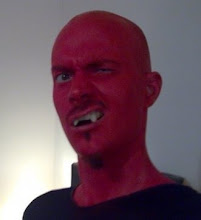Bad Lieutenant: Port of Call New Orleans
The very existence of the film invites wide-eyed incredulity, almost an April Fool come to life.
Werner Herzog, slightly unhinged German director of famously crazy projects, particularly those starring the late Klaus Kinski, re-imagines Abel Ferrera’s unhinged cop in purgatory movie in which Harvey Keitel hoovers up drugs, repeatedly abuses his authority and stands naked, arms outstretched and squealing like a wounded elephant pig whilst searching for those responsible for the rape and murder of a nun. This would be enough to provoke a sensible response along the lines of “What, really?” but that’s before discovering who is on board as the titular cop off the rails - Nicolas Cage.
The Oscar winner had been critical poison for years with a string of stinkers behind him and only a supporting role in Kick Ass serving as a reminder of why the man became a bankable lead. Anyone familiar with the Cage of Vampire’s Kiss, Raising Arizona, Con Air, The Rock and Face Off will know how playful he can be, how willing to push himself to extremes for a performance. The role of Lieutenant Terence McDonagh offers an abundance of gurning opportunity.
Just after Katrina hits New Orleans, McDonagh and his partner Stevie Pruit (a good turn from Val Kilmer) joke about a prisoner left in the basement cells of a police station abandoned as the waters rise, only for McDonagh to relent and jump from a walkway to rescue him, resulting in an spinal injury and a dependence on strong pain killers. He swiftly resorts to less legal means of pain control, hustling from civilians, appropriating from the precinct property room and acquired through drug busts, his hunched shoulders and shorn sideburns culminating in an image of a Frankenstein’s monster; angular and bony, this is a far cry from the ripped Cage of Con Air. Manic cackling, hallucinations and a comically oversized .44 Magnum thrust into his waistband complete the picture of a maniac kept bubbling just beneath the surface by social conventions.
Having said that he is a more rounded character than at first glance. He is in the middle of a relationship with Eva Mendez’s high class prostitute Frankie (Their shared drug use suggests McDonagh’s back condition wasn’t the beginning of his descent); he still tries to care for his dad, a washed up ex cop living from one AA meeting to the next,, saddled with a boozy wife in a tumbledown, rotting plantation-style swamp house.
As is expected, things start to go wrong, McDonagh getting deeper and deeper into trouble during the investigation of the execution of a whole family of Senegalese immigrants, but in a remarkable departure for films of this type things do start working out as the film progresses. Perhaps Herzog is best placed to make a film about redemption after excess. The absence of Catholic guilt from the original is also a welcome change, the moral core coming from McDonagh himself, veering wildly as he does in his efforts to solve the case and his conduct in general. Early on he admonishes Pruit for threats against a suspect under interrogation; later he threatens to kill two old ladies in a nursing home for information about one of their missing grandsons.
The supporting cast sometimes begs the question of where people went. While Mendez is great as Frankie and Brad Dourif wonderful as McDonagh’s exasperated bookie, both are rarely short on parts, Val Kilmer is seldom seen on the big screen these days but is excellent in the small role of Pruit and Faruza Balk makes an appearance - where has she been? Perhaps doomed to be typecast as a shady character, in her small role here as a state trooper it feels like she never went away, Shea Whigham as a client of Frankie’s, Justin “Woah”, does a nice line in lunatic Lynchian characters, ridiculous in most context but just about gelling with the world created here.
Herzog’s direction has a special part to play. From the very first scene of a snake weaving its way across the water, pulling back to reveal the cell in which prisoner Chavez is trapped with water rising, Herzog’s stamp crops up again and again. This opening scene itself seems lifted from a cheesy 80s thriller, so unassuming and yet immediately cinematic, but later scenes of extreme iguana close-ups and alligator POV at a car crash out near the bayou are greater evidence of Herzog’s unique take on McDonagh’s psychological meltdown.
Could this be the rebirth of Cage’s career? Herzog has not suffered similar problems with his choices, but recent films have been critically acclaimed documentaries so it’s heartening that he has lost none of his edge, and is in fact able to inject this into the Hollywood mainstream.

